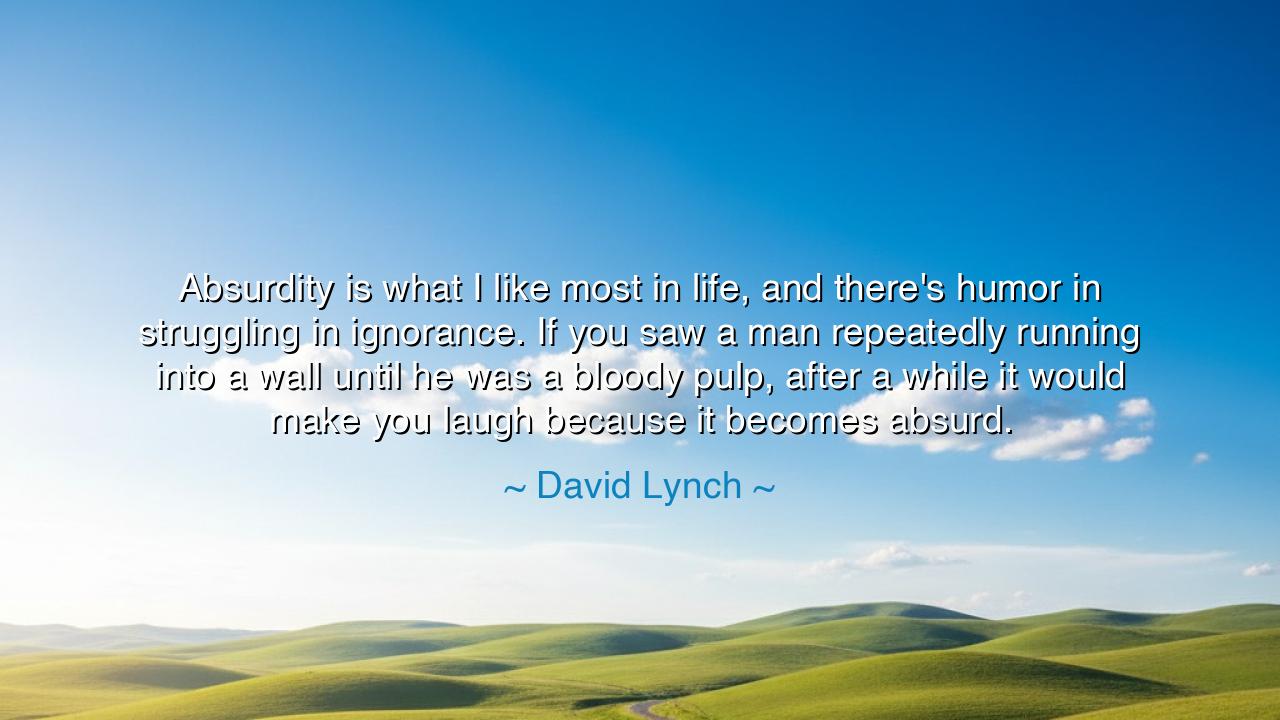
Absurdity is what I like most in life, and there's humor in
Absurdity is what I like most in life, and there's humor in struggling in ignorance. If you saw a man repeatedly running into a wall until he was a bloody pulp, after a while it would make you laugh because it becomes absurd.






When David Lynch said, “Absurdity is what I like most in life, and there’s humor in struggling in ignorance. If you saw a man repeatedly running into a wall until he was a bloody pulp, after a while it would make you laugh because it becomes absurd,” he was not celebrating cruelty, but revealing one of the deepest truths about existence — that life itself, when stripped of illusion, is an absurd dance, a strange mix of suffering and comedy. His words capture the ancient paradox: that within the tragic lies the comic, and within the comic, the tragic — that to live is to stumble, to repeat mistakes, and yet somehow to find laughter even in pain. For absurdity, as Lynch describes, is not madness, but the reflection of humanity’s endless, beautiful struggle to make sense of what cannot be explained.
The ancients knew this well. Socrates, the wisest of Athens, confessed that true wisdom was knowing how little he knew. It was a confession born not of despair, but of humility — the recognition that the universe is vast, and human understanding is small. Lynch’s “struggling in ignorance” echoes this idea: that man, in all his knowledge, still walks blind through a mystery far greater than himself. To laugh at that struggle is not to mock it, but to embrace it — to find joy even as we collide with the walls of our own limitations. In such laughter lies freedom, for the man who can laugh at his ignorance is no longer its prisoner.
Absurdity, to Lynch, is not chaos without meaning — it is life’s hidden poetry, the strange rhythm of existence that both bewilders and delights. He finds humor in the endless cycle of human folly, not because he is heartless, but because he sees the futility of resisting it. In his films — as in life — the absurd is ever-present: the small-town mysteries, the strange silences, the laughter that arises at the edge of darkness. This is the humor of the philosopher, not the cynic — the laughter that comes not from superiority, but from understanding that the human condition itself is an endless attempt to break through walls that were never meant to fall.
There is a story of Camus, the philosopher of the absurd, who said that the only real question in life is whether one should continue living despite its meaninglessness. His answer was yes — for in accepting the absurd, man becomes heroic. Like Sisyphus, eternally rolling his stone uphill only to see it fall again, man finds purpose not in success but in persistence. Lynch’s man running into a wall is a vision of this same eternal figure — broken, frustrated, ridiculous — and yet, by continuing his struggle, somehow transcendent. The laughter that rises from witnessing his futility is not cruelty, but recognition. It is the laughter of empathy — for we, too, are that man.
In this way, humor becomes a form of enlightenment. It is the soul’s way of saying, “Yes, life is senseless — but I am still alive within it.” The ancients would call this balance ataraxia — the calm acceptance of the world as it is, without despair. To laugh in the face of absurdity is to reclaim one’s power over it. It is the highest act of rebellion, because it transforms pain into perspective. Laughter, then, is not the enemy of sorrow, but its twin — both born from the same awareness that we are small creatures in a vast, unknowable play.
David Lynch, through his love of the absurd, teaches us to see beauty in contradiction. The absurd reminds us that meaning and chaos are not enemies, but partners in the great dance of being. To struggle in ignorance is to live honestly — to face the unknown without pretense. And when, after so many collisions, we finally begin to laugh, that laughter becomes a prayer — not of despair, but of surrender to life’s magnificent strangeness. The absurd does not destroy meaning; it deepens it, by showing us how fragile and precious our brief understanding truly is.
The lesson, then, is this: do not fear the absurd — embrace it. When you face frustration, when your efforts seem senseless, when life refuses to explain itself, learn to laugh. Not with bitterness, but with awe. See the comedy in your confusion, the strange beauty in your mistakes. For as Lynch reminds us, there is humor in ignorance, and it is through that humor that we rediscover wonder. In laughter born from struggle lies the wisdom of the ancients — the courage to keep running into life’s walls, not to escape them, but to know them, to feel them, and to smile through the mystery that they represent.






AAdministratorAdministrator
Welcome, honored guests. Please leave a comment, we will respond soon